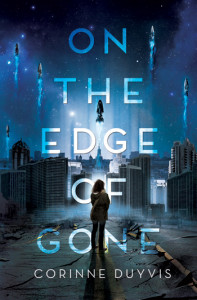“The first time my future vanished was July 19, 2014.” Thus begins Corinne Duyvis’s stunning post-apocalyptic novel On the Edge of Gone, the story of an autistic biracial teenager, Denise, and her effort to save those closest to her and herself.
 Denise’s future is about to vanish because a comet is scheduled to strike the earth in six months. Those with power or special skills will live permanently on generation ships, sustainable cities orbiting the earth. Those without end up in temporary shelters for the impact, then scraping out a living on a ruined, toxic planet. By lucky coincidence, Denise and her drug-addicted mother survive the impact on a generation ship that hasn’t yet launched because of mechanical problems, but they must prove their worth to be able to stay afterward. To complicate matters, Denise’s sister is missing, and Denise has pledged to find her, necessitating multiple forays into the post-apocalyptic world, an eye-opening visit to one of the temporary shelters, and challenging social interactions with a variety of people whose intentions Denise struggles to comprehend.
Denise’s future is about to vanish because a comet is scheduled to strike the earth in six months. Those with power or special skills will live permanently on generation ships, sustainable cities orbiting the earth. Those without end up in temporary shelters for the impact, then scraping out a living on a ruined, toxic planet. By lucky coincidence, Denise and her drug-addicted mother survive the impact on a generation ship that hasn’t yet launched because of mechanical problems, but they must prove their worth to be able to stay afterward. To complicate matters, Denise’s sister is missing, and Denise has pledged to find her, necessitating multiple forays into the post-apocalyptic world, an eye-opening visit to one of the temporary shelters, and challenging social interactions with a variety of people whose intentions Denise struggles to comprehend.
Along with the gripping storyline, Duyvis grapples with disability and the value of a human life. At a time of scarce resources, choices must be made as to who lives and who dies. Who gets to make those choices and on what basis? Along with the others on the broken generation ship, Denise tries to make herself useful, though she knows she is at a disadvantage because of her emotional vulnerability and proneness to meltdowns. Even more of a challenge is her mother, who deals and uses drugs and embarrasses Denise at every turn, but for whom Denise feels responsible. After all, he mother and her sister are the people who’ve helped Denise navigate the world and (contrary to other, less informed portrayals by those not on the autism spectrum), Denise feels attachment and empathy shown through actions that speak louder than words.
Like her protagonist, Duyvis is diagnosed on the autism spectrum, and reading this book will challenge readers’ stereotypes of autistic characters. There is no stylized “autism voice” here, but vivid, honest narrative through the eyes of a brave teenager who views the world a bit differently from her peers and the adults around her. The novel is set in the Netherlands, and through Denise, we see this centuries-old European city before and after and what its loss – and the loss of her entire world – means. We also see her strong will to survive and the statement it makes about the value of a human life – all human life, regardless of what riches and skills we show on the outside.